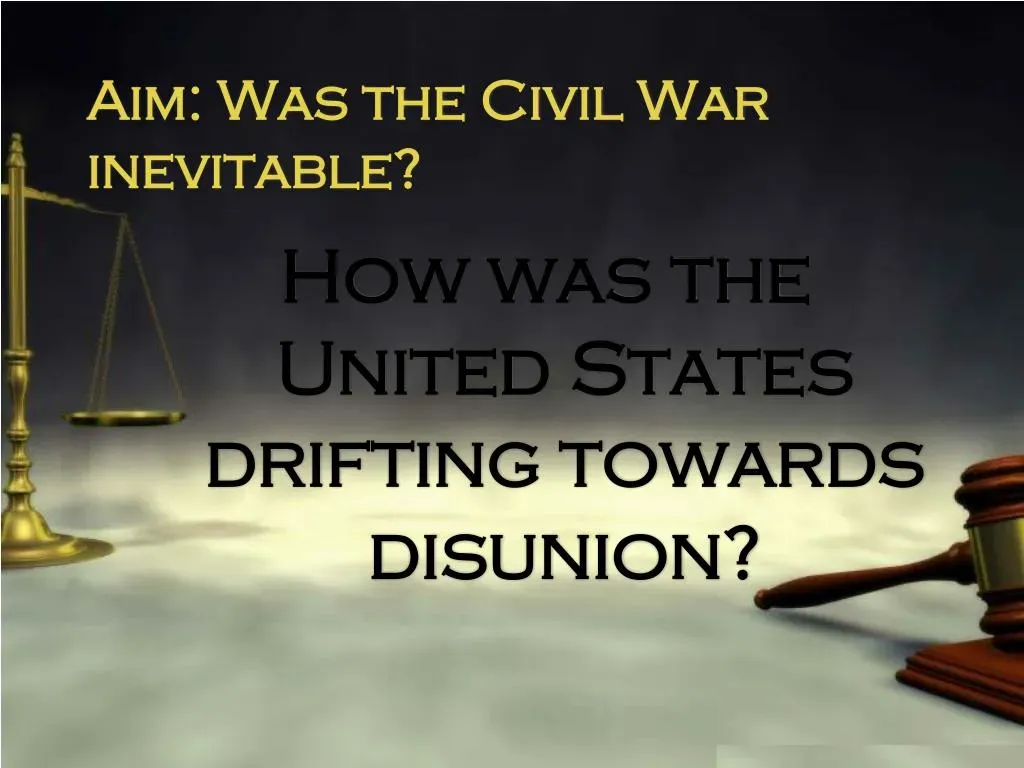The concept of Civil War inevitability looms large in American history, provoking vigorous debate among scholars and enthusiasts alike. Geography, economics, and deep-seated social tensions all played crucial roles as the nation veered toward conflict, primarily driven by the contentious issue of slavery. As President Abraham Lincoln grappled with the profound moral dilemmas posed by slavery, his distinct approaches to governance sparked discussions about potential compromises and the escalating tension between the North and South. Understanding the causes of the Civil War requires a keen analysis of the historical events leading up to the conflict, including the failures of Civil War compromises intended to preserve the Union. Ultimately, the impact of the Civil War not only reshaped a nation but also set the stage for modern struggles for freedom and equality, highlighting the complex interplay of ideals that define American society.
Exploring the notion of inevitability in the context of the Civil War reveals a tangled web of historical factors that led to this tragic chapter in American history. The schisms between slave and free states created a backdrop for rising tensions, where pivotal events like the Dred Scott decision and John Brown’s raid sparked fierce debate and division. With Lincoln’s complex relationship with slavery and his gradual embrace of emancipation, the discourse around compromise and conflict deepened, framing the war as an essential turning point in national identity. The resolutions proposed during Congressional debates undoubtedly illustrate the ever-deepening chasm between opposing viewpoints, ultimately culminating in a confrontation that would define the nation’s trajectory. Analyzing the ideological battles surrounding this period offers profound insights into the America we live in today.
The Historical Events Leading to the Civil War
The period leading up to the Civil War was marked by a series of escalating tensions and conflicts, a cacophony of historical events that foreshadowed the impending conflict. Key among these was the issue of slavery, intricately woven into the fabric of American society. From the Missouri Compromise of 1820, which attempted to maintain a balance between slave and free states, to the Compromise of 1850, which included the controversial Fugitive Slave Act, these events highlighted the deep-seated divisions between the North and South. The infamous Dred Scott decision in 1857 further exacerbated tensions, declaring that African Americans could not be citizens and that Congress had no authority to regulate slavery in the territories. Each of these moments painted a foreboding picture of the turmoil that would lead to war.
Furthermore, the emergence of violent confrontations, such as “Bleeding Kansas,” underscored the conflict between pro-slavery and anti-slavery factions. The violent struggle for Kansas was not just a battle for territory but also a fight over the moral direction of the nation. The rise of abolitionists like John Brown intensified fears in the South, while figures such as Harriet Beecher Stowe, through her novel ‘Uncle Tom’s Cabin,’ ignited Northern sympathy towards the abolition cause. These historical events collectively morph into a narrative that frames the Civil War as an inevitable outcome of a nation struggling with its identity, values, and vision for the future.
Causes of the Civil War: Slavery as a Central Issue
Slavery emerged as the undeniable cause of the Civil War, entwining itself with political, economic, and social paradigms of the time. While Southern economies thrived on slave labor, Northern states began to increasingly challenge the moral legitimacy of slavery, setting the stage for a monumental clash. Abolitionists vehemently advocated for personal liberty and human rights, while Southern leaders argued for a ‘Southern way of life’ built on agricultural supremacy and social hierarchy. The palpable tension reached critical mass with Lincoln’s election in 1860, where his anti-slavery stance was perceived as a direct threat to the institution of slavery and the socio-economic stability of the Southern states.
Moreover, the insistence on expanding slavery into new territories fueled discord, as debates over popular sovereignty vs. federal dictate further divided lawmakers and citizens alike. The implementation of the Kansas-Nebraska Act in 1854, which effectively repealed the Missouri Compromise, allowed for potential slavery in territories previously designated as free. This legislative move triggered violent conflict and made clear that the path toward reconciliation was riddled with ideological and ethical landmines. With each legislative failure and moral failure, calls for civil war grew louder, signifying that for many, the question was no longer about simply preserving the Union but also about the very nature and moral fabric of American identity.
Lincoln and Slavery: Evolution of Beliefs
Lincoln’s relationship with slavery reflected a complex evolution, marked by pragmatism and profound moral awakening. Initially, he approached his role with caution, understanding the political landscape and realizing that radical abolitionist views could alienate key states and supporters. His famous assertion, “If slavery is not wrong, nothing is wrong,” encapsulated his moral opposition, yet he recognized the necessity of navigating the political currents with care, opting to focus on the containment of slavery rather than its immediate abolition. This reluctance stemmed from his democratic ethos and a desire for consensus amidst a nation in ruin.
As the war progressed, the urgency to address emancipation grew clearer to Lincoln. The issuance of the Emancipation Proclamation in 1863 marked a pivotal moment, transforming the war’s narrative from solely preserving the Union to one fundamentally about ending slavery. This strategic shift not only aimed to weaken Southern morale but also sought to rally support among abolitionists and free Blacks. Thus, Lincoln’s journey reflects not only the evolution of a leader confronted with unprecedented national turmoil but also signifies a broader acknowledgment of the moral imperative against slavery. His transformation from cautious politician to a figure of emancipation illustrates how political leadership can evolve amid crises.
Civil War Compromises and Their Failures
The approaches to avoiding civil conflict often manifested as compromises, indicating the persistent hope for a peaceful resolution. However, each compromise ultimately laid bare the deep divisions rather than bridging them. The Missouri Compromise, which allowed Missouri to enter the Union as a slave state while prohibiting slavery in the northern part of the Louisiana Purchase, was a crucial early attempt at balance but soon unraveled. The Compromise of 1850 aimed to satisfy both pro-slavery and anti-slavery factions by admitting California as a free state while enacting stricter fugitive slave laws. Yet, the tensions these compromises sought to alleviate only festered further, exemplifying the inability of political frameworks to solve the moral crisis posed by slavery.
Attempts at compromise culminated in the Cruelty of the Kansas-Nebraska Act, which reopened the issue of slavery in territories and spurred violent confrontations between settlers. These fateful legislative actions demonstrated that compromises merely postponed the inevitable clash, leading many to argue about the inevitability of the Civil War. The failure of the ‘Peace Conference’ prior to Lincoln’s inauguration underscored this dissatisfaction; representatives were unable to agree on a path toward peace. In retrospect, these compromises reveal a hesitance to confront the deeply polarized nature of American society, as both sides held onto increasingly hostile positions, making it painfully clear that the time for dialogue had run out.
The Impact of the Civil War on American Society
The implications of the Civil War were vast and transformative, shaping the trajectory of American society for generations. With an estimated 620,000 to 750,000 casualties, the human cost was staggering, leaving deep psychological scars across a nation struggling to rebuild. The war catalyzed industrial growth and changed the balance of economic power, solidifying the North’s industrial economy over the South’s agrarian ethos. This shift laid the groundwork for modern America but came at an unthinkable price, underscoring how warfare can reshape a nation’s economic foundations even as it fractures societal ties.
Socially, the Civil War ignited discussions about rights, citizenship, and what it meant to be American. The passage of the Thirteenth, Fourteenth, and Fifteenth Amendments marked a monumental shift toward civil rights for formerly enslaved individuals, yet the implementation of these rights faced significant challenges during Reconstruction and beyond. The promise of freedom did not necessarily equate to actual equality, as systemic racism and social stratification persisted, signaling that while the war might have ended slavery, the struggle for true equality and civil rights was far from complete. The war’s impact thus rippled through American society, interweaving themes of hope and disillusion, liberty and oppression.
Frequently Asked Questions
What were the major causes of the Civil War and its inevitability?
The major causes of the Civil War included deep-seated economic, social, and political differences between the North and South. The South’s reliance on slavery as an economic foundation clashed with the North’s growing abolitionist sentiments. Key events like the Missouri Compromise, the Dred Scott decision, and the rise of sectional tensions made the Civil War seem inevitable as both sides failed to find a lasting compromise.
How did Lincoln’s views on slavery contribute to the Civil War’s inevitability?
Lincoln’s strong position against the expansion of slavery played a crucial role in the Civil War’s inevitability. His belief that ‘a house divided against itself cannot stand’ highlighted the unsustainable nature of a nation divided on slavery. While he initially attempted to contain slavery rather than abolish it outright, his election as president galvanized Southern fears and led to secession.
What historical events led to the inevitability of the Civil War?
Several historical events contributed to the Civil War’s inevitability, including the Compromise of 1850, the Kansas-Nebraska Act, and John Brown’s raid on Harpers Ferry. These events intensified the conflict over slavery and revealed how the factions were increasingly unwilling to compromise, setting the stage for violent confrontation.
What role did compromises play in the path to the Civil War’s inevitability?
Compromises such as the Missouri Compromise and the Compromise of 1850 were attempts to quell tensions between North and South. However, these compromises often failed to address the underlying issues of slavery and territorial expansion, leading to further divisions and creating a perception that war was the only solution.
How did the impact of the Civil War shape American society and future politics?
The impact of the Civil War fundamentally reshaped American society and politics, leading to the abolition of slavery, the establishment of Reconstruction, and changing the balance of power between states and the federal government. The war also set a precedent for future civil rights movements and political conflicts by redefining the relationship between liberty and governance in America.
| Key Points | Description | |
|---|---|---|
| Civil War Inevitability Debate | This piece explores whether the Civil War was inevitable, highlighting perspectives from historians and examining Lincoln’s evolving beliefs. | |
| Lincoln’s Initial Actions Against Slavery | Before fully committing to the fight against slavery, Lincoln sought compromise and dialogue with Southern leaders. | |
| The Willard Peace Conference | Despite efforts, the conference showed that both sides could not find common ground on the issue of slavery. | |
| Compromise Failed | Even proposals to guarantee slavery’s existence in Southern states failed to prevent conflict. | |
| Lincoln’s Transformation | Over time, Lincoln shifted his focus from preserving slavery to preserving the Union. | |
| Historical Perception | The narrative of war often portrays it as inevitable; however, the pieces show how choices led to conflict. | |
| Legacy of the War | The transformative aspect of the Civil War was in its long-term impact on racial relations and American identity. | |
Summary
The question of Civil War inevitability looms large in American history, inviting deep reflection on the choices made leading up to the conflict. While many argue that the war was unavoidable due to deeply entrenched issues surrounding slavery and state rights, examination of historical events like Lincoln’s initial attempts for compromise suggests that alternative paths were conceivable. Ultimately, the Civil War was not just a product of fixed convictions, but rather a tragic result of missed opportunities for dialogue and understanding, serving as a crucial lesson on the significance of addressing profound societal divides before they erupt into violence.



